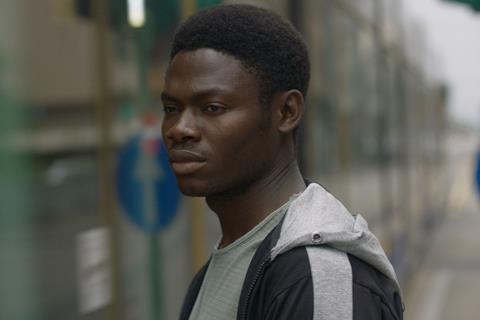The theft of a bicycle is the catalyst for this confident, incisive drama about a Sengalese immigrant in Italy

Dir/scr: Milad Tangshir. Italy. 2024. 85 mins.
The life of an undocumented Senegalese immigrant in Italy is subjected to forensic, compassionate and troubling examination in Anywhere Anytime, the sole Italian film playing in Venice’s International Critics’ Week. Based on the theft of a bicycle, the Iranian-born Milad Tangshir’s debut feature following a series of award-winning documentary shorts, looks at first like straight-up social protest. But it also has the deceptive artistry of a fable as it confidently appropriates plot details and themes from Bicycle Thieves, suggesting that de Sica’s masterpiece tells a story that sadly shows no sign of growing old.
A truly worthy successor of, and not just a homage to, the de Sica classic
Issa (Ibrahima Sambou), six years in Italy, is summarily dismissed from his job on Italy’s Porta Palazzo market. His friend Mario (Moussa Dicko), who is working legally, suggests that Issa becomes a delivery rider, and helps Issa out with not only the money to help him buy a bike, but also by giving him the paperwork and phone that Issa will need. The fact that Issa is using Mario’s identity will come back to haunt him terribly over the film’s final stretch.
Initially things go well, as Issa flies around the city on his new wheels, the very image of vulnerability but also of freedom amongst the roaring traffic of the city. (The bitterly ironic title, which suggests that immigration is an ever-present social issue, is also the name of the delivery company.) Issa fancies the effervescent Awa (Success Ede), who lives near him on a prefab housing project, and he takes her out for a nighttime spin, a dreamy and beautiful sequence that uses slow motion in a rare stylistic deviation in a film which for most of the time shuttles between elegantly-framed fixed camera and energetic tracking shots. Ede has a potent screen presence, and when she disappears from the film, the audience misses her almost as much as Issa does.
Because about half an hour in, perhaps inevitably, Issa’s bike is stolen (significantly, and complicatedly, we later learn, by Moroccan immigrants). With that, the pace of the film turns suddenly frenzied as Issa, like Antonio in Bicycle Thieves, goes in search of the thief, with ultimately tragic consequences.
Behind Issa’s pursuit of the thief, as he frenetically runs around a noisy and vibrant city that now feels as though it has now closed its last port of entry, is a subtle moral fable of a man who wishes to be good and whose dignity incredibly remains intact, but who is condemned to continually stand on the verge of becoming the criminal that society has already decided he should be.
Two quiet scenes in particular stand out for their great power. One is in a soup kitchen in which the camera frames the (presumably real-life) faces of society’s outcasts as a priest meaninglessly intones the Lord’s Prayer, and reveals Tangshir’s roots in documentary film-making. Each of them has a story like this one, waiting to be told. The other, a marvel of naturalistic dialogue and mutual kindness, has Issa help an old lady (Raffaella Russo) take her shopping up to her apartment and then sit and listen to her gently complain to him about the difficulties of her life. Neither the institutions nor the individuals that Issa is in contact with are necessarily bad – it’s their indifference and blindness to his plight as a human being that are the problem.
Sambou, in a physically demanding role, plays Issa as outwardly impassive: but a repeated shot of his eyes, as windows of the soul, suggest that they have already seen everything but have not yet lost their vulnerability as he encounters one misfortune after another (Its final denouement may indeed come over to some as one twist of the knife too many). We never learn about the particular circumstances of Issa’s journey to Italy, but he’s far from being a generic everyman.
Music is key to the mood and meaning of Anywhere Anytime, with several lengthy sequences accompanied by striking pieces which seem to show how important African music has been to a society that now refuses to acknowledge the humanity of the cultures that made it. Tesfa Maryam Kidane’s 1970 classic of Ethiopian jazz, Heywete, for example, kicks things off, with Aurora in Peking by the guitarist Marc Ribot another piece that becomes positively wrenching when heard in this context. It is at moments like these that Anywhere Anytime shows it is a truly worthy successor of, and not just a homage to, the de Sica classic that is always looking over its shoulder.
Production companies: Vivo film, Young Films, Rai Cinema
International sales: Fandango (sales@fandango.it)
Producers: Marta Donzelli, Gregorio Paonessa, Carla Altieri, Roberto De Paolis
Screenplay: Giaime Alonge, Daniele Gaglianone, Milad Tangshir Cinematography: Giuseppe Maio
Production design: Leonie Heys Cerchio
Editing: Enrico Giovannone
Main cast: Ibrahima Sambou, Moussa Dicko Diango, Success Edemakhiota






















